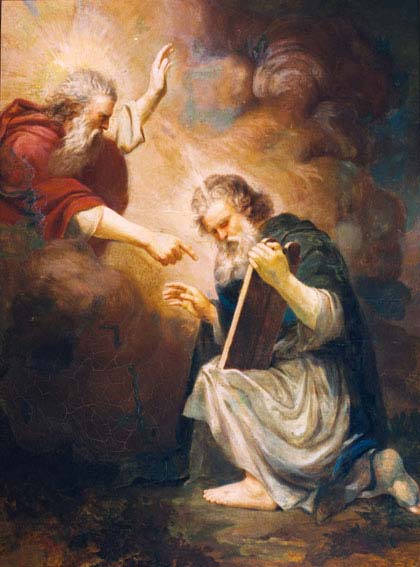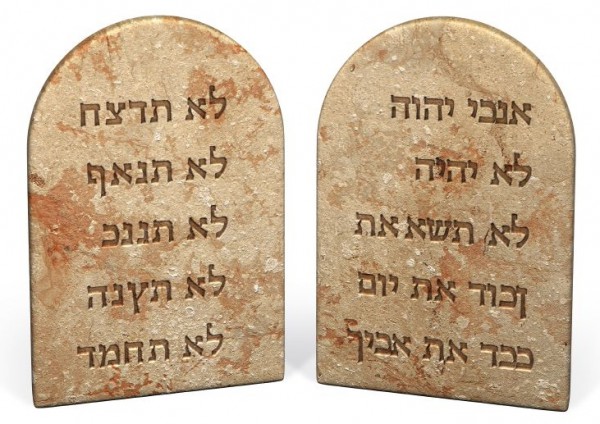Parasha Mishpatim (Laws)
Exodus 21:1–24:18, 30:11–16; Jeremiah 34:8–22, 33:25–26; 11 Kings 12:1–17; Matthew 17:1–11
“And these are the laws [mishpatim]….” (Exodus 21:1)
In last week’s study, we read about God giving the Ten Commandments to the children of Israel through His servant, Moshe (Moses). (Exodus 14:31)
This portion of Scripture (Parasha) begins by describing a whole system of civil legislation, such as the rights of persons, slaves and servants, as well as laws concerning murder, personal injuries, offenses against property, and moral offenses.
These ancient codes are still relevant today. The laws found here are powerful and deep, and they remain a meaningful treasure in the Word of God.
The spirit of lawlessness causes many people to resent rules and regulations; however, without a standardized code of laws, chaos and anarchy reigns, and the love of many grows cold. (Matthew 24:12)
In fact, the closer we move toward the end times, the more lawless society seems to become, which is consistent with end-time prophecy.
“For the secret power of lawlessness is already at work; but the one who now holds it back will continue to do so till he is taken out of the way.” (2 Thessalonians 2:7)
God is a God of peace and order. Laws are absolutely necessary to live a righteous, loving and peaceful life.
God’s Law for Slavery: A Humane Approach
“If you buy a Hebrew servant, he is to serve you for six years. But in the seventh year, he shall go free, without paying anything.” (Exodus 21:2)
The first set of laws presented in this Parasha deals with Hebrew servants, also called slaves.
Even though the Israelites had been set free from slavery in Egypt, they had slaves and/or servants themselves.
Back then, a person might become a slave through poverty, debt, crime, or through being sold by someone; for instance, a father might sell a daughter in an effort to give her a good life with a wealthy family.
A Hebrew slave was not to be treated as an object that could be owned, but as a person. Furthermore, in the seventh year, the slave had to be set free.
A slave, however, who freely chose to remain a slave, would be brought before God to the door or the doorpost (mezuzah), where his master would pierce his ear with an awl (a kind of needle). After that, the slave would be bound to serve his master forever. (Exodus 21:6)
Similarly, when we freely pledge our allegiance to Yeshua (Jesus), out of love, we become a lifetime slave of God, which leads to becoming a holy and righteousness servant.
“Don’t you know that when you offer yourselves to someone as obedient slaves, you are slaves of the one you obey—whether you are slaves to sin, which leads to death, or to obedience, which leads to righteousness?” (Romans 6:16)
Slave, Servant, Worker, and Worshiper
The concept of slavery permitted by the Torah was quite different from the cruel Greek and Roman systems.
In fact, the Hebrew language does not differentiate between slave, servant, worker or worshiper. The word for all of these is eved (plural – avadim).
“Behold, bless the Lord, all servants [avadim] of the Lord, who serve by night in all the house of the Lord!” (Psalm 134:1)
Eved has no connotation of shame; it actually shares the same root as the verb to work or to serve (avad).
In Scripture, voluntary work is not a consequence of the Fall. Even in the Garden of Eden, God put Adam to work (l’avdah) to keep (l’shamrah) the Garden. (Genesis 2:15)
Moses used this same word for “work” when God commanded Pharaoh: “Let My people go, so that they may worship [avad] Me in the desert.” (Exodus 7:16)
Similarly, the Hebrew noun avodah, which is related the verb avad, means work, service, worship and ministry, as these ideas are interconnected in Hebrew.
“Always give yourselves fully to the work [avodah] of the Lord, because you know that your labor in the Lord is not in vain.” (1 Corinthians 15:58)
Eved Mashiach (Servant Messiah)
No one really likes to feel like a slave forced into drudgery or servitude, like some kind of Cinderella, scrubbing the dirty floors of her wicked stepmother and stepsisters.
Perhaps we all feel like this at times, and yet, Yeshua made the remarkable claim that whoever desires to be great should be a servant, and whoever desires to be first, should be a slave. (Matthew 20:26–27)
“For the son of Man did not come to be served but to serve [l’avdah] and give His life as a ransom for many.” (Matthew 20:28)
Yeshua the Messiah modeled this spirit of service.
Before the Feast of Passover, Yeshua wrapped a towel around him, washed his disciples’ dirty feet, and said to them:
“I have set for you an example that you should do, as I have done for you. Very truly I tell you, no servant [eved] is greater than his master, nor is a messenger greater than the one who sent him.” (John 13:15–16)
That Yeshua came as a servant is prophecy fulfilled:
“He who formed me in the womb to be His Servant [Eved] to bring Jacob back to Him, and gather Israel to Himself. … It is too small a thing for you to be my Servant [Eved] to restore up the tribes of Jacob and to bring back those of Israel I have kept.” (Isaiah 49:5–6)
How did Yeshua, who had the exalted position of Son of God and El Gibor (Mighty God), so easily humble Himself as a servant?
The answer is in John 13:
“Yeshua knew that the Father had put all things under his power, and that he had come from God and was returning to God.” (John 13:3)

“For even the Son of Man came not to be served but to serve, and to give his life as a ransom for many.” (Mark 10:45)
Yeshua knew who He was, what God had given Him, where He was from and where He was going, and that He would sit at the right hand of His Father in Heaven.
His conviction of His own standing, identity, purpose and authority afforded Him such security that He could walk in humility without being humiliated.
When we also receive deep into our spirit this knowledge of our inheritance, identity, purpose and authority in Messiah, then we can serve the Lord humbly, unnoticed, and even do unappreciated tasks with gladness of heart rather than resentment.
We can joyfully serve Him because He is not only our Master, but also our most intimate friend.
“I no longer call you servants [avadim], because a servant does not know his master’s business. Instead, I have called you friends [y’didim], for everything that I learned from My father I have made known to you.” (John 15:15)









